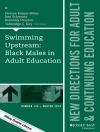This Third Update on Adult Learning Theory followstwo earlier volumes on the same topic, the firstpublished in 1993 and the secondin 2001. Only one topic, transformative learning theory, can befound in all three updates, representing the continuingdevelopments in research and alternative theoretical conceptions of TL.
Thanks to a growing body of research and theory-building, threetopics briefly touched on in 2001 are now separate chapters in thisthird update:
* spirituality and adult learning
* learning through the body
* narrative learning in adulthood
Also new in this update is a chapter on non-Western perspectiveson learning and knowing. New developments in two other areas arealso explored: understanding the connection between the brain andlearning, and how modern and postmodern ways of knowing areconverging and are bring expressed in social movements. Theconcluding chapter identifies two trends in adult learning theoryfor the twenty-first century: attention to context, and to theholistic nature of learning in adulthood.
This is 119th volume of the Jossey-Bass quarterly report series New Directions for Adult and Continuing Education. Noted forits depth of coverage, New Directions for Adult and Continuing Education is an indispensable series thatexplores issues of common interest to instructors, administrators, counselors, and policymakers in a broad range of adult andcontinuing education settings, such as colleges and universities, extension programs, businesses, libraries, and museums.
İçerik tablosu
EDITOR’S NOTES (Sharan B.Merriam).
1. Transformative Learning Theory (Edward W.Taylor)
Empirical research on transformative learning has burgeoned in thelast decade, as have alternative theoretical conceptions totheories first proposed by Mezirow and Freire.
2. Workplace Learning: Emerging Trends and New Perspectives (Tara Fenwick)
Workplace learning is much more than training; attention is turningto practice-based perspectives and power and politics in workplacelearning.
3. Spirituality and Adult Learning (Elizabeth J.Tisdell)
Spirituality and spiritual development are, or can be, integral toan adult’s learning experiences.
4. Learning Through the Body (Tammy J.Freiler)
Embodied learning as another way of knowing and the body as a siteof learning are explored in this chapter.
5. Teaching with the Brain in Mind (Kathleen Taylor, Annalee Lamoreaux)
New research in neuroscience is revealing how the brain translatesexperience into learning and how learning changes the brain.
6. Narrative Learning in Adulthood (M. Carolyn Clark, Marsha Rossiter)
Narrative learning–learning through stories and storying ourexperiences–is legitimizing an ancient form of humanlearning.
7. Non-Western Perspectives on Learning and Knowing (Sharan B. Merriam, Young Sek Kim)
Indigenous knowledge and non-Western religious and philosophicalsystems are challenging our historically cognitive processingorientation to adult learning.
8. Troubling Adult Learning in the Present Time (Robert J. Hill)
Modern and postmodern ways of knowing are converging in a new New Social Movement.
9. Adult Learning Theory for the Twenty-First Century (Sharan B. Merriam)
Attention to contexts in which learning takes place as well as theholistic nature of learning are characterizing movements in adultlearning theory today.
INDEX.
Yazar hakkında
Sharan B. Merriam is professor of adult education at the University of Georgia, Athens.












